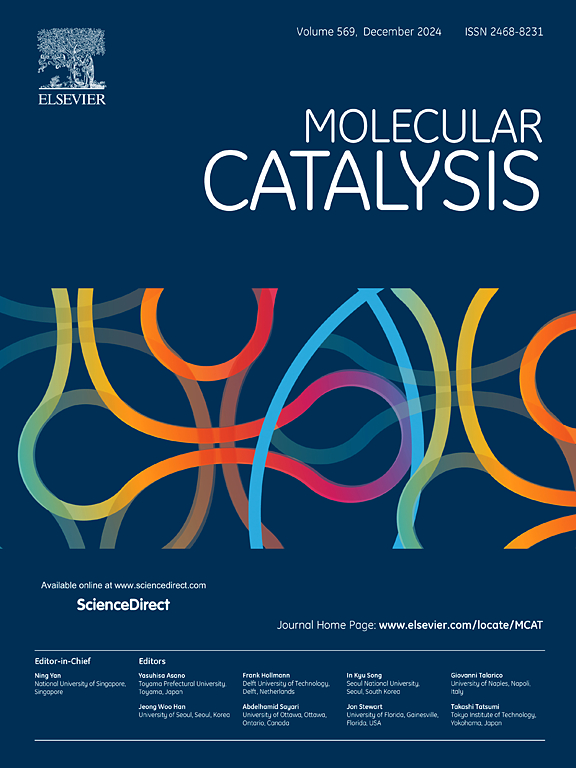在含铜/铁沸石上将甲烷直接和选择性氧化成甲醇
IF 4.9
2区 化学
Q2 CHEMISTRY, PHYSICAL
引用次数: 0
摘要
在温和的条件下将甲烷高选择性地直接转化为甲醇是催化领域的一大难题。主要的挑战来自于一级 C-H 键的高稳定性和甲醇的易过氧化性。在众多催化材料中,含铜/铁沸石催化剂因其在将甲烷直接和选择性氧化成甲醇方面的显著优势和独特潜力而受到广泛关注和深入研究。在本展望中,我们介绍了将含铜/铁沸石作为催化剂用于将甲烷直接氧化成甲醇的最新进展。此外,还重点介绍了为了解含铜/铁沸石的内在活性位点和反应机理而应用的最先进的原位表征技术。最后,研究了催化剂的合理设计、相关原位/操作表征技术的开发以及与外部能源或其他有前途的 C-C 耦合过程耦合的可行方法等方面的挑战和机遇,以启发未来的研究方向。本文章由计算机程序翻译,如有差异,请以英文原文为准。

Direct and selective oxidation of methane into methanol over Cu/Fe-containing zeolites
Direct transformation of methane into methanol with high selectivity under mild conditions is one of the holy grails in catalysis. The major challenges arise from the high stability of the primary C-H bonds and the facile overoxidation of methanol. Among the numerous catalytic materials applied, Cu/Fe-containing zeolite catalysts have garnered considerable efforts and intensive investigation due to their significant advantages and distinctive potential in direct and selective oxidation of methane into methanol. In this Prospect, we present the recent progress of the application of Cu/Fe-containing zeolites as catalysts for the direct oxidation of methane into methanol. Furthermore, the state-of-the-art ex/in situ characterization techniques applied to understand the intrinsic active sites and reaction mechanisms for Cu/Fe-containing zeolites are also highlighted. Finally, the open challenges and opportunities regarding rational design of catalysts, the development of correlative in situ/operando characterization technologies and the feasible approaches by coupling with external energy resources or with other promising C-C coupling processes, are examined for inspiring future directions.
求助全文
通过发布文献求助,成功后即可免费获取论文全文。
去求助
来源期刊

Molecular Catalysis
Chemical Engineering-Process Chemistry and Technology
CiteScore
6.90
自引率
10.90%
发文量
700
审稿时长
40 days
期刊介绍:
Molecular Catalysis publishes full papers that are original, rigorous, and scholarly contributions examining the molecular and atomic aspects of catalytic activation and reaction mechanisms. The fields covered are:
Heterogeneous catalysis including immobilized molecular catalysts
Homogeneous catalysis including organocatalysis, organometallic catalysis and biocatalysis
Photo- and electrochemistry
Theoretical aspects of catalysis analyzed by computational methods
 求助内容:
求助内容: 应助结果提醒方式:
应助结果提醒方式:


